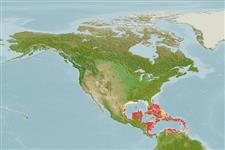>
Gobiiformes (Gobies) >
Gobiidae (Gobies) > Gobionellinae
Etymology: Ctenogobius: Greek, kteis, ktenos = comb + Latin, gobius = gudgeon (Ref. 45335).
More on authors: Gilbert & Randall.
Environment: milieu / climate zone / depth range / distribution range
Ecologia
marinhas associadas(os) a recifes; intervalo de profundidade 0 - 40 m (Ref. 13628). Tropical; - 9°N
Western Central Atlantic: southern Florida, USA and the Bahamas to South America.
Tamanho / Peso / Idade
Maturity: Lm ? range ? - ? cm
Max length : 5.0 cm TL macho/indeterminado; (Ref. 7251)
Espinhos dorsais (total) : 7 - 8; Raios dorsais moles (total) : 13; Espinhos anais: 1; Raios anais moles: 12. Mottled light gray dorsally, shading to white ventrally, with a midlateral row of blackish dashes, often alternating with small black spots; a vertical black line through eye (Ref. 13442).
Facultative air-breathing in the genus (Ref. 126274); Inhabits open bottoms composed of sand and fine silt (Ref. 5521). Observed to share a burrow with shrimps.
Life cycle and mating behavior
Maturidade | Reprodução | Desova | Ovos | Fecundidade | Larvas
Robins, C.R. and G.C. Ray, 1986. A field guide to Atlantic coast fishes of North America. Houghton Mifflin Company, Boston, U.S.A. 354 p. (Ref. 7251)
Categoria na Lista Vermelha da IUCN (Ref. 130435: Version 2024-1)
Ameaça para o homem
Harmless
Utilização humana
Pescarias: espécies comerciais; Aquário: Espécies comerciais
Ferramentas
Relatórios especiais
Descarregue XML
Fontes da internet
Estimates based on models
Preferred temperature (Ref.
123201): 25.2 - 28.1, mean 27 °C (based on 134 cells).
Phylogenetic diversity index (Ref.
82804): PD
50 = 0.5000 [Uniqueness, from 0.5 = low to 2.0 = high].
Bayesian length-weight: a=0.00724 (0.00338 - 0.01553), b=3.05 (2.87 - 3.23), in cm total length, based on LWR estimates for this (Sub)family-body shape (Ref.
93245).
Nível Trófico (Ref.
69278): 3.4 ±0.42 se; based on food items.
Resiliência (Ref.
120179): Elevada, tempo mínimo de duplicação da população menor que 15 meses (Preliminary K or Fecundity.).
Fishing Vulnerability (Ref.
59153): Low vulnerability (10 of 100).
Nutrients (Ref.
124155): Calcium = 229 [99, 504] mg/100g; Iron = 1.06 [0.51, 2.11] mg/100g; Protein = 17.9 [15.9, 19.6] %; Omega3 = 0.108 [0.043, 0.237] g/100g; Selenium = 29.2 [11.6, 73.7] μg/100g; VitaminA = 130 [34, 488] μg/100g; Zinc = 2.67 [1.63, 4.13] mg/100g (wet weight);
